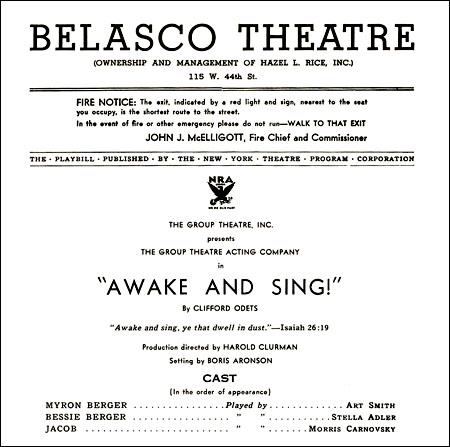I crammed four shows into today’s Wall Street Journal drama column, a feat of compression made possible by the fact that I didn’t like any of them. I reviewed reasons to be pretty, Happiness, Irena’s Vow, and Hair. Here’s an excerpt.
* * *
Neil LaBute, Off-Broadway’s most prolific playwright, has finally made it uptown. “reasons to be pretty” (the absence of capitalization is the author’s inexplicable affectation) is now playing on Broadway after a successful run at MCC Theater. I wouldn’t be at all surprised if it does as well this time around, for what we have here is a kinder, gentler Neil LaBute, one who lets his hapless protagonist part way off the hook instead of letting him twist and turn all night long. That’s what makes “reasons to be pretty” suitable for uptown consumption. It’s Mr. LaBute’s first semi-optimistic play–which turns out not to be a good thing….
“reasons to be pretty” is standard-issue LaBute, a fast-paced sequence of ante-upping scenes in which the men are pigs, the women are victims and everyone (including the women) talks dirty. If you’ve never seen any of Mr. LaBute’s plays, you might well find this one fresh, but this is the sixth one I’ve reviewed, and I’m sorry to say that his style has hardened into a set of tricks and mannerisms that he uses to say the same things over and over again….
Susan Stroman and John Weidman, who last collaborated nine years ago on “Contact,” have reunited for “Happiness,” a musical inspired by “Outward Bound,” Sutton Vane’s 1923 play about a group of travelers on an ocean liner who discover that they are (A) dead and (B) en route to their Final Destination. Mr. Weidman, who wrote the book, has changed the setting to modern-day Manhattan and the ocean liner to a subway car, in the process inserting every theatrical cliché and social, sexual, ethnic and political stereotype known to man…
Dan Gordon has performed a feat of upside-down alchemy with “Irena’s Vow”: He’s taken the true story of a Polish Catholic girl (Tovah Feldshuh) who saved the lives of 11 Jews by hiding them in the cellar of a Nazi major (Thomas Ryan) and turned it into an egrgeiously sappy piece of what can only be called Holocaust kitsch….
The Public Theater’s Shakespeare in the Park revival of “Hair” has moved to Broadway, restaged and recast but identical in spirit to the outdoor version that I saw in Central Park last August. The direction and choreography, by Diane Paulus and Karole Armitage, are as festive as ever, and the onstage band is still lava-hot, especially Bernard Purdie on drums. The show itself, alas, is also unchanged: The first act is lively but smug, the second act a hopelessly incoherent mess…
* * *
Read the whole thing here.
Archives for April 3, 2009
TT: The critic who got his hands dirty
 I recently posted a week’s worth of almanac entries drawn from The Collected Works of Harold Clurman, an eleven-hundred-page anthology devoted mainly but by no means exclusively to the drama criticism of a man who is better known as a director. In addition to co-founding the Group Theatre in 1931, Clurman directed the Broadway premieres of Arthur Miller’s All My Sons and After the Fall, Clifford Odets’ Awake and Sing! and Golden Boy, William Inge’s Bus Stop, Carson McCullers’ The Member of the Wedding, and Eugene O’Neill’s A Touch of the Poet. He was, in short, a first-tier theatrical professional–yet he also spent most of the second of his life doubling as a working drama critic, and his reviews, as I discovered when I read them in bulk last week, are as fresh and instructive today as they were when they were originally published in The New Republic and The Nation between 1948 and Clurman’s death in 1980.
I recently posted a week’s worth of almanac entries drawn from The Collected Works of Harold Clurman, an eleven-hundred-page anthology devoted mainly but by no means exclusively to the drama criticism of a man who is better known as a director. In addition to co-founding the Group Theatre in 1931, Clurman directed the Broadway premieres of Arthur Miller’s All My Sons and After the Fall, Clifford Odets’ Awake and Sing! and Golden Boy, William Inge’s Bus Stop, Carson McCullers’ The Member of the Wedding, and Eugene O’Neill’s A Touch of the Poet. He was, in short, a first-tier theatrical professional–yet he also spent most of the second of his life doubling as a working drama critic, and his reviews, as I discovered when I read them in bulk last week, are as fresh and instructive today as they were when they were originally published in The New Republic and The Nation between 1948 and Clurman’s death in 1980.
Needless to say, no reputable magazine or newspaper would now allow Clurman to write drama reviews while simultaneously working as a Broadway director. Is arts journalism in America better off as a result of this change in ethical standards? I very much doubt it–and thereby hangs a “Sightings” column. In Saturday’s Wall Street Journal I take a closer look at Clurman’s criticism. What made it so good? To find out, pick up a paper on Saturday and see what I have to say.
UPDATE: Read the whole thing here.
UPDATE: Yes, I know, Clurman produced Miller’s All My Sons, he didn’t direct it. Elia Kazan did, and he also staged After the Fall (Clurman was involved with the first production, but in a different capacity). My mistake–I had a fit of absentmindedness. These things happen, arrgh.
* * *
Harold Clurman talks about the state of American theater in the Seventies:
TT: Almanac
“Good critical writing is measured by the perception and evaluation of the subject; bad critical writing by the necessity of maintaining the professional standing of the critic.”
Raymond Chandler, letter to Frederick Lewis Allen (May 7, 1948)
